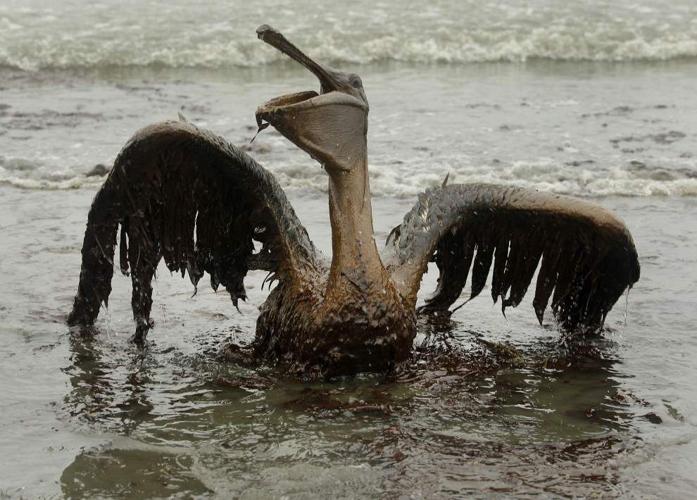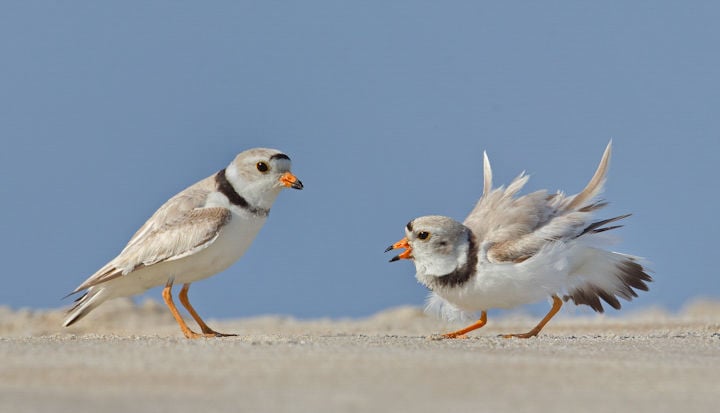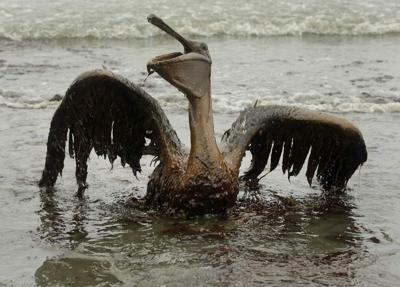In its last weeks, President Donald Trump’s administration is rolling back a landmark bird conservation law that led to more than $100 million in fines against BP for the Deepwater Horizon oil disaster.
The U.S. Fish and Wildlife Service is taking final steps for changes to the Migratory Bird Treaty Act, a century-old law that prohibits killing migratory birds either purposefully or accidentally. The proposed changes would legalize “incidental” killings, including predictable and preventable ones that may occur from industrial hazards and oil spills.
“Any ‘incidental’ death – no matter how inevitable, avoidable or devastating to birds – becomes immune from enforcement from the law,” said David Yarnold, president and CEO of the National Audubon Society.

A flock of pelicans gather on University Lake in Baton Rouge on November 2, 2019.
The administration is hastily trying to upend other environmental protections before President-elect Joe Biden enters the White House on Jan. 20. Efforts are underway to boost drilling in the Arctic National Wildlife Refuge in Alaska, open more national forests to logging roads and loosen marine vessel noise restrictions that protect endangered whales.
On Friday, the Fish and Wildlife Service acknowledged that the changes to the migratory bird rule will benefit industries, saving them money on fines and conservation measures, but many more birds will die.
"Negative impacts on migratory birds are expected to increase over time as more entities react to the certainty that incidental take is not prohibited," the agency said in the rule change's final environmental impact statement.
Some of the nearly 1,100 bird species protected under the act could be pushed to the brink of extinction.

A prothonotary warbler, a bird protected under the Migratory Bird Treaty Act, perches on a branch along the Reserve Relief Canal in Reserve on May 12, 2006.
“As birds of conservation concern and other vulnerable bird species face likely negative effects from (the rule changes), some may decline to the point of requiring listing under the Endangered Species Act,” the EIS said.
Businesses that have been penalized for killing birds, such as oil companies, would see several advantages, including fewer fines, greater legal certainty and the elimination of costly practices that reduce bird deaths. For example, businesses could abandon the current practice of delaying construction and vegetation clearing in migratory bird habitat during the nesting season.
“There is a cost to delaying projects until after nesting season, and some operators may choose to avoid such costs with no threat of enforcement under the act,” the EIS said.

Birders search for spring's migratory birds during the St. Bernard Bird Festival in May 2017.
Of the nearly $180 million in Migratory Bird Treaty Act fines and other corrective actions over the past decade, more than half – about $100 million – were the result of the 2010 Deepwater Horizon disaster.
The migratory bird portion of fines against BP, which were deposited in the North American Wetland Conservation Fund, have been used to protect and restore several hundred thousands of acres of habitat in Louisiana and other states along the Gulf of Mexico. Some of the money went as far as North Dakota and Canada’s central prairie provinces to preserve landscapes on the north end of the Mississippi River Basin’s migratory route.
If the Trump administration’s interpretation of the law had been in place in 2010, BP would have faced no consequences under the act for the more than 1 million birds killed by the massive oil spill, environmental groups say.

An endangered whooping crane in flight.
The administration’s efforts to weaken the act began in late 2017, when the U.S. Interior Department issued a legal opinion and policy directives that said only intentional bird killings were covered.
That triggered lawsuits from Audubon and other environmental groups, as well as eight states: New York, Massachusetts, New Jersey, Maryland, Illinois, New Mexico, California and Oregon.
In August, a federal judge in New York ruled against the administration.
“It is not only a sin to kill a mockingbird, it is also a crime,” U.S. District Judge Valarie Caproni wrote in her decision. “But if the Department of the Interior has its way, many mockingbirds and other migratory birds that delight people and support ecosystems throughout the country will be killed without legal consequence.”

Piping plovers spend winters along the Louisiana coast.
The administration is appealing the decision and moved forward with the environmental impact statement, a process that Noah Greenwald, endangered species director of the Center for Biological Diversity, called a “thinly veiled attempt” to rush the new policies through before Biden is sworn in.
Yarnold, of Aubon Society, agreed.
“Trump is in a frenzy to finalize his bird-killer policy before the end of the year,” he said. “The administration lost in court and is sidestepping that ruling with a rushed, corrupt process designed to keep the next administration from saving the lives of millions of birds. Reinstating this 100-year-old bedrock law must be a top conservation priority for the Biden-Harris administration.”
Glenn Oussett leads a group of expectant bird watchers to the top of a three-story lookout in rural St. Bernard Parish. The view is panoramic,…
It triples amount of federal money available to fight spread of nutria
After a decade of petitions and lawsuits from environmental groups, the federal government has granted endangered species protection to a myst…















